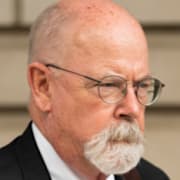bakgrund
Senatens underrättelseutskott
Wikipedia (en)
The United States Senate Select Committee on Intelligence (sometimes referred to as the Intelligence Committee or SSCI) is dedicated to overseeing the United States Intelligence Community—the agencies and bureaus of the federal government of the United States who provide information and analysis for leaders of the executive and legislative branches. The Committee was established in 1976 by the 94th Congress. The Committee is "select" in that membership is temporary and rotated among members of the chamber. The committee comprises 15 members. Eight of those seats are reserved for one majority and one minority member of each of the following committees: Appropriations, Armed Services, Foreign Relations, and Judiciary. Of the remaining seven, four are members of the majority, and three are members of the minority. In addition, the Majority Leader and Minority Leader are non-voting ex officio members of the committee.
As part of its oversight responsibilities, the Committee performs an annual review of the intelligence budget submitted by the president and prepares legislation authorizing appropriations for the various civilian and military agencies and departments comprising the intelligence community. These entities include the Office of the Director of National Intelligence, Central Intelligence Agency, Defense Intelligence Agency, National Security Agency, National Geospatial-Intelligence Agency, National Reconnaissance Office, as well as the intelligence-related components of Department of State, Federal Bureau of Investigation, Department of the Treasury, and Department of Energy. The Committee makes recommendations to the Senate Armed Services Committee on authorizations for the intelligence-related components of the U.S. Army, U.S. Navy, U.S. Air Force, and U.S. Marine Corps. The Committee also conducts periodic investigations, audits, and inspections of intelligence activities and programs.
In a March 6, 2008, letter to the Senate leadership, 14 of the 15 current members of the Committee proposed the creation of a new Senate Appropriations Subcommittee on Intelligence to prepare the annual intelligence budget. The proposed Subcommittee, on which members of the Intelligence Committee would be heavily represented, would increase the Committee’s influence and leverage over executive branch intelligence agencies, and require continuing disclosure of the annual budget for the National Intelligence Program. The proposal has been opposed by the leadership of the Senate Appropriations Committee, however.
In 2013, and beyond, the SSCI received renewed attention in the wake of Edward Snowden's disclosures regarding the NSA surveillance of communications. Senator Dianne Feinstein and the SSCI made several statements on the matter, one of which was notably disputed: that the NSA tracked US citizens locations via cellphone. Later, the SSCI Staff Director, David Grannis, claimed that the NSA did not collect cellphone location, claiming the Senator was "speaking extemporaneously".
The SSCI later came to prominence in relation to voting to publish in March 2014 and then publishing in December 2014 of a report on the policies of the CIA on torture.




